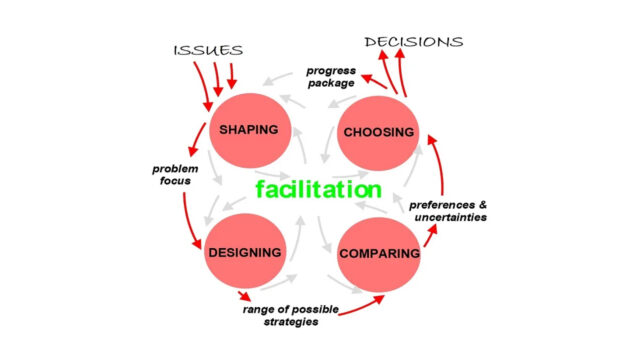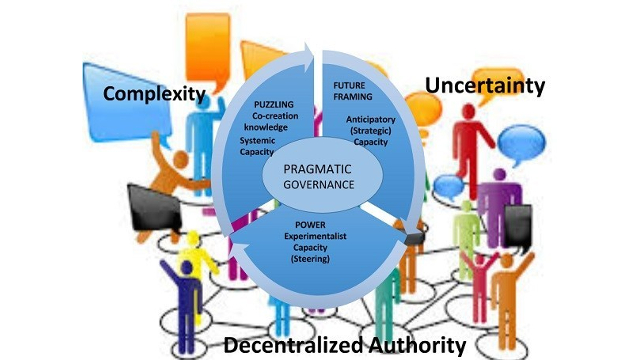
Managing in the face of complexity (part 4.2): Appropriate approaches – 2. Problem-Driven Iterative Adaptation (PDIA)
This article is part 4.2 of a series of articles featuring the ODI Working Paper A guide to managing in the face of complexity.
This section [parts 4.1 to 4.8 of the series] outlines specific methods that can be used for managing in the face of complexity. Most of these approaches were originally developed in corporate business, where the shortcomings of centralised ‘command and control’ models were first noted, but have since spread into public sector management. These approaches are aligned with the general principles for managing complex interventions outlined … [in the previous parts of this series], but each has a specific focus and is tailored for particular circumstances or purposes.
2. Problem-Driven Iterative Adaptation (PDIA)
This adaptive managed approach was recently proposed by Andrews et al.1 as a way to avoid the capability traps created by ‘isomorphic mimicry’, the overarching and still dominant theory of change in international development, characterised by inappropriate transfers of best practice that fail to improve the performance of institutions in developing countries. PDIA consists of four core principles, which fit a wide range of implementation options adaptable to a variety of modalities and country contexts:
- Aim to solve particular problems in specific local contexts: The starting point for an intervention should be locally defined problems, not the selling of externally determined solutions (often in the disguise of ‘best practice’). Problem-focused processes put the onus on performance, not compliance and can get agents to work through the complexity of these problems and identify possible entry points for solutions (e.g. de-construct problems, identify root causes, reflect on structural weaknesses). These processes can become the basis of coalition building across networks and generating action and change. They also provide an open space for novelty and put the emphasis on improved functionality.
- Create an ‘authorising environment’ for experimentation and ‘positive deviance’: To be genuinely useful, problems must offer local agents a pathway to find solutions – which is not the case with pre-fabricated solutions imported from outside, because those are unlikely to address all the dimensions needing attention. Instead solutions need to emerge from an incremental process consisting of small steps of experimenting with potential remedial actions and identifying ‘positive deviations’ from extant realities. Such steps have the prospect of early success, help flush out contextual challenges, and frequently result in hybrid combinations of elements that are aligned to operate in new ways. Such a process is only possible when innovation is encouraged and rewarded by the authorising environment within which key decisions are made.
- Create active learning mechanisms and iterative feedback loops: A stepwise change process has its greatest impact when connected with learning mechanisms that ensure the dynamic collection and immediate feedback of lessons about what works and why. Such learning is active and based on real-world experimentation, which is different from the field experiments used in randomised trials. And these dynamic learning mechanisms also differ significantly from traditional monitoring and evaluation mechanisms that focus on compliance with a predefined route and allow lessons only at the end of an intervention.
- Engage broad sets of agents for assuring viability, legitimacy and relevance: Processes of change and development are most effective when they simultaneously take place top-down and bottom-up, making use of distributed agency. The involvement of front line agents is particularly important as they are less embedded in extant rules, which makes them more open to criticizing incumbents and entertaining change. But since they lack the power to make change happen, something must bridge those with ideas to those with power. Such links could be provided by individuals, organisations or networks that facilitate transition. Broad engagement in developing solutions can also lead to better diffusion of these changes.
PDIA shares similarities with other new approaches. For instance, ‘Cash on Delivery’ aid, a mechanism by which donors deliver resources for achievements against a benchmark, freeing up the recipient to achieve results however it wishes2. Organisations like Innovations for Scaled Impact (iScale) are based on similar principles of bringing together local control over the problem nomination and definition stage, with support to innovations built within tight feedback loops of evaluation and embedded in communities of practice (see www.scalingimpact.net). The World Bank is attempting support to various types of ‘results-based financing’ (see Brenzel3 on World Bank supported health projects) and has introduced a new Program-for-Results lending.
Next part (part 4.3): Appropriate approaches – 3. Strategic Assumption Surfacing And Testing (SAST).
See also these related series:
- Exploring the science of complexity
- Planning and strategy development in the face of complexity
- Taking responsibility for complexity.
Article source: Hummelbrunner, R. and Jones, H. (2013). A guide to managing in the face of complexity. London: ODI. (https://www.odi.org/sites/odi.org.uk/files/odi-assets/publications-opinion-files/8662.pdf). Republished under CC BY-NC-ND 4.0 in accordance with the Terms and conditions of the ODI website.
Header image source: pxhere, Public Domain.
References:
- Andrews, M., Pritchett, L. and Woolcock, M. (2012). Escaping Capability Traps through Problem-Driven Iterative Adaptation (PDIA). CGD Working Paper 299, Washington, DC. Center for Global Development. ↩
- Birdsall, N. & W. Savedoff (2010). Cash on Delivery: A New Approach to Foreign Aid. Washington, DC: Center for Global Development. ↩
- Brenzel, L. (2009). Taking Stock: World Bank Experience with Results-Based Financing (RBF) for Health. Briefing Note, World Bank: Health, Nutrition and Population Unit. ↩






